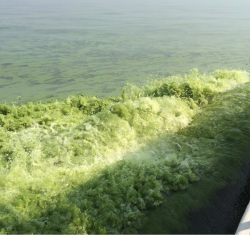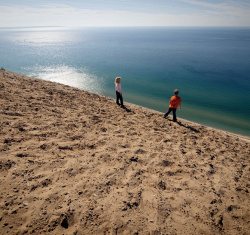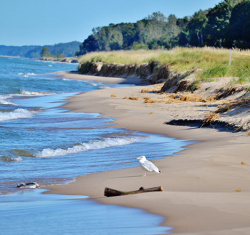
 back to all faculty
back to all faculty
Gregory Dick

About
Dr. Gregory Dick is the Director of the Cooperative Institute of Great Lakes Research (CIGLR) and an Alfred F. Thurnau Professor in the School for Environment and Sustainability and the Department of Earth and Environmental Sciences. He also holds affiliations in the Department of Ecology and Evolutionary Biology, the Center for Computational Medicine and Bioinformatics, and the Chemical Biology Graduate Program. Professor Dick's research focuses on the role of microorganisms in shaping environmental processes, water quality, and biogeochemistry. His lab specializes in the use of 'omics (genomics, transcriptomics, etc.) to study microbial communities in a wide variety of environments including the deep sea, the Great Lakes, the human gut, and engineered systems. His current research focuses on the microbial ecology of harmful cyanobacterial blooms that threaten freshwater ecosystems around the world, using Lake Erie as a natural laboratory.
Publications
Hellweger FL, RM Martin, F Eigemann, DJ Smith, GJ Dick, SW Wilhelm (2022). Models predict planned phosphorus load reduction will make Lake Erie more toxic. Science 376: 1001-1005.
Yancey CE, DJ Smith, PA Den Uyl, OG Mohamed, F Yu, SA Ruberg, JD Chaffin, K Goodwin, A Tripathi, DH Sherman, and GJ Dick (2022). Metagenomic and Metatranscriptomic Insights into Population Diversity of Microcystis Blooms: Spatial and Temporal Dynamics of mcy Genotypes, Including a Partial Operon That Can Be Abundant and Expressed. Applied and Environmental Microbiology 88: e02464-21.
Smith DJ, MA Berry, RM Cory, TH Johengen, GW Kling, TW Davis, and GJ Dick (2022). Heterotrophic Bacteria Dominate Catalase Expression during Microcystis Blooms. Applied and Environmental Microbiology 88: e02544-21.
Klatt JM, A Chennu, BK Arbic, BA Biddanda, D de Beer and GJ Dick (2021). Possible link between Earth’s rotation rate and oxygenation. Nature Geoscience 14: 564-570.
Dick GJ (2019). The microbiomes of deep-sea hydrothermal vents: distributed globally, shaped locally. Nature Reviews Microbiology 17: 271-283.
2022-2025: (PI) HAB-OA 2022: Synergistic impact of climate induced acidification, temperature, total alkalinity and nutrients on cyanobacteria HABs in the Great Lakes. NOAA. $1.2M (With Reagan Errera et al.)
2022-2027 (PI) Cooperative Institute of Great Lakes Research. NOAA. $53M
2020-2025 (Co-PI) Host and Microbial Metabolism in Graft versus Host Disease. NIH. $11.7M (With Pavan Reddy et al.)
2018-2024 (PI) Discovery and characterization of new toxins in genomes and metagenomes of bloom-forming cyanobacteria; Great Lakes Center for Fresh Waters and Human Health. NSF/NIEHS $480k (With David Sherman).
2020-2024 (PI) Determining how the ecophysiology of different Microcystis strains underpins succession and toxicity of harmful cyanobacterial blooms in Lake Erie. Michigan Sea Grant, NOAA. $200k
2023 Arthur F. Thurnau Professor
2020 John Dewey Award for teaching, College of Literature, Arts, and Sciences, University of Michigan
2020 GSA Geobiology and Geomicrobiology Post-Tenure Award
2019 Geoclub Best Professor (Department of Earth and Environmental Sciences)
2015 Individual Award for Outstanding Contributions to Undergraduate Education, College of Literature, Science, and Arts, University of Michigan
2013 Alfred P. Sloan Research Fellow in Ocean Science
PhD, Scripps Institution of Oceanography (marine biology)
BA, University of Virginia (biology)
2021-present Member, NOAA Great Lakes Regional Collaboration Team
2014-present Editorial Board, Environmental Microbiology
2014-2022 Subject Editor (Molecular Geomicrobiology), Geobiology.
Professional society memberships: American Geophysical Union; International Society for Microbial Ecology; American Society for Microbiology, American Society for Limnology and Oceanography






